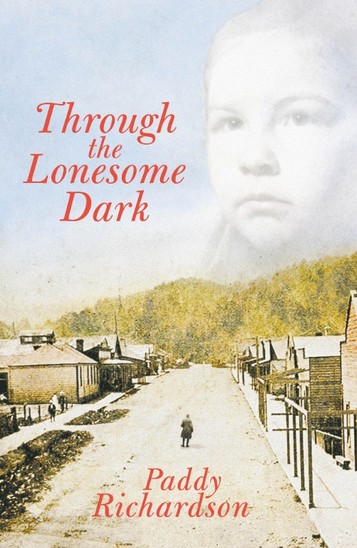
by Paddy Richardson
When I’ve finished reading the book I take another look at the cover. A photograph of what seems to be the main street of a small town, and the face of a young girl.
The story’s opening chapter, as does a photo credit, confirms the setting is Blackball, West Coast mining town. The period, early twentieth century.
The conversational style of the opening chapter, by way of a genderless narrator, drew me right into the social atmosphere, though it also impeded reading in places when I had to go over a sentence more than once to be sure of the intention.
We are introduced to three families and, in particular, to one child from each – Pansy, Clem, and Otto – a tight group of friends in spite of differences between the families. Pansy’s Catholic, Clem’s Presbyterian, Otto’s German, and religious and racial prejudices aren’t left behind even in such a small place where one might hope there’d be more to bind people than separate them.
Of the three, the focus is on Pansy who, although she qualifies for a scholarship that would give her secondary school education, must instead work as a maid at a boarding house.
…first Daddy stole Pansy’s chance from her and now Mrs Smithson steals Pansy’s time with her I want and I expect, and worst of all, she steals Pansy’s own thoughts away from her with all those words she flings at her, words that hover about her so she can scarcely breathe for them, words so sharp they stab into her skin, words that sit on Pansy’s head, pressing and pressing.
For the girl from Blackball things can hardly get worse, you think. Yes, they can.
From Part 2, the divisions become more marked as World War l breaks out, and Otto’s family become referred to as “Krauts”. From then on it’s Pansy and Clem, as Otto is not in the picture, for a reason we have to wait to learn.
The miners of Blackball are exempt from military service, but Clem goes against the town’s feelings and volunteers for the New Zealand Tunnelling Company. Now it is he who becomes the central character. The rest of the story is his, and through Clem we learn of this aspect of our military history.
If them at home knew what he did. Their dead lads lying down there, passed by without a second look, trampled by the boots walking over them, gnawed on by the rats. Lads that should have been back home working and building things up, wedding their girls and looking to have little lads and girls of their own.
Vivid descriptions of the situation, the conditions and the work of these men show a depth of research by the author.
At the end, however, I feel less than satisfied – let down by the structure of the novel. The tone of the opening chapter is never repeated; no more is said of Otto, though there’s a pressing reason we want to know more; and the six parts the story is divided into seem arbitrary. Which is why I go back to re-examine the cover for clues. The story starts and ends in Blackball, right enough. The girl is still there, though her place as central character is usurped and she has become incidental. The title doesn’t really help me. Somehow I’m left thinking that along the way the story was undermined, something slipped and slid away from underneath me as two seams fractured and moved apart.
That said, the quality of the writing throughout is very good, and details of the story overall will remain.
Author: Paddy Richardson
Publisher: Upstart Press
ISBN: 978-1-927262-98-6
RRP: $34.99
Available: bookshops

 RSS Feed
RSS Feed
